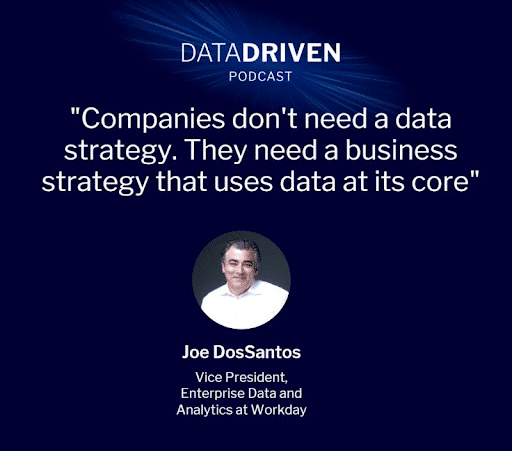From volume to value: A new era in data management and unification

In the ever-evolving data management and unification landscape, staying informed and adaptable is key. In a recent episode of the DataDriven podcast, Reltio CEO and Founder Manish Sood interviewed Joe DosSantos, VP of Enterprise Data and Analytics at Workday, to discuss how organizations navigate the complex world of today’s data landscape.
Key takeaways from the DataDriven Podcast interview with Joe DosSantos:
- In a data-rich world, an enterprise’s competitive edge comes not from data volume but from how effectively information is transformed into actionable insights.
- Traditional data handling methods, often static and inflexible, are yielding to more dynamic, interactive, and reusable data products.
- Ensuring high-quality data is readily available is foundational to leveraging AI effectively in any business setting.
- The concept of data communities is increasingly important. Fostering collaborative environments is about sharing data and exchanging insights, methodologies, and perspectives that can spark innovation.
The importance of a value-based data orientation
A value-based orientation in data management involves collecting and storing vast amounts of data and leveraging it to create tangible, measurable business value. In a data-rich world, the competitive edge comes not from data volume but from how effectively information is transformed into actionable insights. In the early days of big data, companies were keen to stockpile as much information as possible. While having lots of data seemed like a competitive advantage, most learned over time that getting value from stockpiled data is complicated. The value lies in the utilization of data, not the volume and most organizations learned that the sheer volume complicates everything.
A value-based data approach necessitates a shift in organizational mindset. It’s not just about having data analysts and scientists sift through data; it’s about embedding data-driven thinking across all departments. Whether marketing, sales, product development, or customer service, each function must understand how to use data to drive decision-making and innovate.
Moreover, there is significant importance in aligning data strategy with business objectives. Data initiatives must be closely tied to key performance indicators (KPIs) and overall business goals. This alignment ensures that data initiatives contribute directly to business growth and success rather than existing as isolated IT projects.

The evolution of data products
The evolution of data products is marking a significant shift in how enterprises interact with and perceive data. Traditional data handling methods, often static and inflexible, are yielding to more dynamic, interactive, reusable data products, reshaping industries.
Modern data products are more than just information repositories; they are interactive, evolving entities that learn and adapt. The comparison to the training process of ChatGPT is particularly enlightening. When ChatGPT was exposed to a broader audience, it demonstrated the importance of diverse and extensive feedback in refining AI models. This adaptability and continuous learning are what set modern data products apart.
Further, the the shift from data being a passive element to an active participant in business strategy. Data products now are not just about storing and retrieving information but also about engaging with it in a way that drives innovation and growth. These products are increasingly becoming the backbone of decision-making processes, providing real-time insights and predictive analytics.
The concept of data democratization also surfaces in the discussion. Data products are breaking down the barriers of data accessibility, allowing a wider range of users to interact with and derive insights from information. Democratization is crucial for fostering a culture of data-driven decision-making across all levels of an organization.
AI and data availability strategy
There is also an essential relationship between AI and data availability strategies. An effective AI strategy is futile without a corresponding focus on data availability. Businesses often invest heavily in AI technologies, but without accessible, quality data, these investments can become fruitless. Ensuring data is readily available and of high quality is foundational to leveraging AI effectively in any business setting.
Community building is key
Internal data communities are becoming increasingly important within companies as they can foster a collaborative, cross-functional environment that enhances knowledge sharing and promotes a data-driven culture. These communities are crucial for innovation and problem-solving as they unite diverse perspectives and expertise. Additionally, they contribute to efficient resource utilization and better data governance and help companies maintain a competitive edge in an increasingly data-centric business landscape.
Platforms like Slack are tools that facilitate this internal marketplace, where questions can be asked and answered, creating a dynamic, learning-focused environment. This concept underscores the importance of having data and creating an ecosystem to share and utilize it efficiently.
Navigating the Data-Driven Business Landscape
Data management and unification strategies are rapidly changing, and organizations must adapt to stay relevant. A value-based approach to data, understanding the evolving nature of data products, prioritizing data availability for AI strategies, and fostering a knowledge-sharing community are not just options but necessities. A data-driven future is one where technology, data, and business objectives are seamlessly integrated. AI and machine learning continue to evolve, further empowering businesses to harness the full potential of their data.
